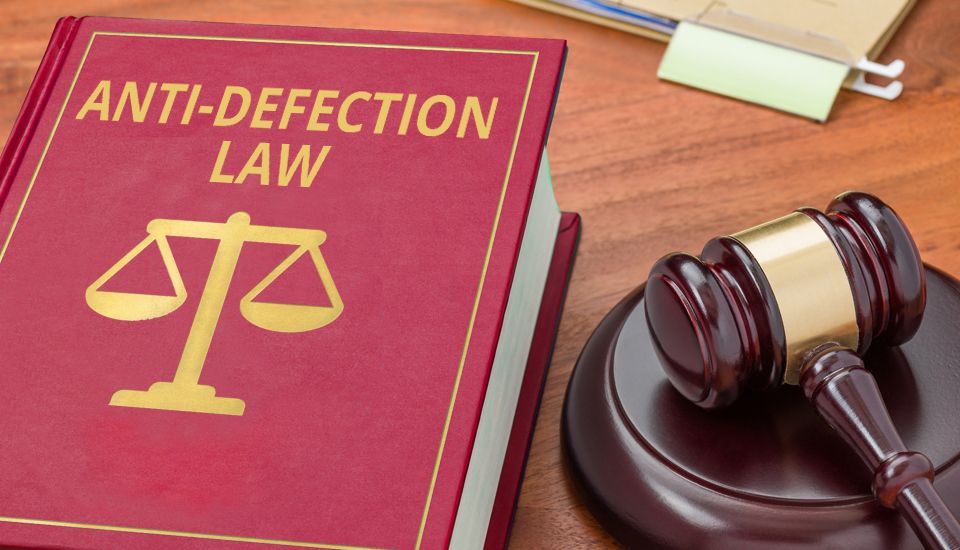Latest News
The History and Relevance of Anti-Defection Law

Aayaa Ram Gayaa Ram (Ram has come, Ram has gone) is an expression used commonly in Indian politics to refer to political horse-trading, frequently turn coating and floor crossing. The term originated when in 1967, when Gaya Lal, a Member of the Legislative Assembly, from Pataudi Vidhan Sabha Constituency of Haryana. He won the election as an independent candidate and joined the Indian National Congress (INC) and thereafter changed his political allegiance thrice in a single day. Even after this incident, Gaya Lal, a frequent floor-crosser frequently came switching parties and contested elections under different parties such as the Akhil Bhartiya Arya Sabha in 1972, joined the Bhartiya Lok Dal under Chaudhary Charan Singh in 1974 and became the source of the coining of the term Aayaa Ram Gayaa Ram.[i]
The Anti Defection Law of 1985 was passed to prevent defections. It was included in the constitution under Rajiv Gandhi’s rule as the tenth schedule of the Constitution of India.
It applies to both Parliament and state legislative, and specifies the process for the Speaker of the house (presiding officer of the legislation), to disqualify a member of the legislation, on the petition of any member of the house.
The main intentions of the laws were:
- Keep political corruption in check.
- Bring stability in politics to strengthen democracy.
- Ensure that members of the legislation more responsible and loyal to their political party.[ii]
The Chavan committee proposed that a member who switches party affiliation for monetary gain or other kinds of greed, such as an executive office pledge, should not only be excluded from parliament but also barred from contesting elections for a defined period of time.
A change was proposed to the Tenth Schedule in 2003 to make the current legislation more effective in dealing with regular defections. The Constitution (Ninety-first Amendment) Bill was proposed by a committee led by Pranab Mukherjee, observing that the exemption provided by authorising a break, granted in paragraph three of the Schedule, was being blatantly violated, creating several splits in different political parties.
The Statement of Objects and Reasons of the Fifty-Second Amendment (1985) to the Constitution explained the reasons for the addition of this Schedule in the following words, "The evil of political defections has become a matter of national concern. If it is not combated, the very pillars of our society and the values which support it are likely to be eroded. With this object, an assurance was given in the address by the President to Parliament that the government intended to introduce in the current session of Parliament an anti-defection Bill. This Bill is meant for outlawing defection and fulfilling the above assurance.”
In Kihoto Hollohan v Zachillhu[iii], a case that also analysed numerous other facets of this law, the nature of this anti-defection legislation was discussed in depth. Here, speaking of the need for an anti-defection statute, the court said the goal is to curb the evil of political defections motivated by the lure of office or other similar considerations that threaten our democracy's foundations." The solution suggested disqualifying from continuing as a Member of the Assembly the members of either the House of Parliament or the State Legislature who are considered to have defected. Section 2 of the Tenth Schedule defines the conditions for disqualification.
India is a great democracy and by the democratic mandate, the representatives of the House and Legislative Assemblies serve the citizens of their constituencies. Policy parties pan out the wicked tradition of defection for personal and political benefit. It has now been profoundly inculcated in the political system notwithstanding the bar on the defection to attain the prime seat of the States or the Nation.
The Anti-Defection Bill must be checked by Parliament and it is important to correct the loopholes. The Indian Constitution reads in its preamble the Division of Power, but unlike the United States of America, the absolute Separation of Power is not exercised in the country. Today, Parliament and the Judiciary are in desperate need of the Anti-Defection Legislation to come together and make changes as necessary and implement the same to curb the common defection activity.
In the Constitution, the adoption of Schedule X aimed to enact a substantive statute that would attack the possibility of defection. Although the legislation has succeeded to a fair degree in this aspect, there were some ambiguities. The Land Courts have done a good job in clarifying the position by adapting the statute to relevant facts and situations. Nevertheless, very few common propositions that have a universal application have been set down. Thus, there seems to be considerable scope for judicial interpretation, one that may give further clarity on the law and may bring in a wider range of cases within the umbrella of this legislation.
[i]Vibhor Relhan, The Anti-Defection Law Explained, PRS LEGISLATIVE RESEARCH (Jan. 27, 2021, 11:40 AM), https://www.prsindia.org/theprsblog/anti-defection-law-explained
[ii]Prachi Kaur & Roshni Sinha, The Anti-Defection Law: Intent and Impact, PRS LEGISLATIVE RESEARCH (Jan. 27, 2021, 11:45 AM), https://www.prsindia.org/sites/default/files/parliament_or_policy_pdfs/Anti-Defection%20Law%20Intent%20and%20Impact_0.pdf
[iii]Kihoto Hollohan v. Zachillhu, AIR 1992 SCR (1) 686



































































































